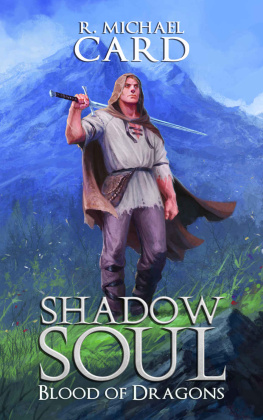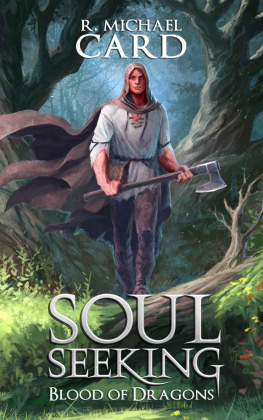Card - SPEAKER FOR THE DEAD
Here you can read online Card - SPEAKER FOR THE DEAD full text of the book (entire story) in english for free. Download pdf and epub, get meaning, cover and reviews about this ebook. genre: Detective and thriller. Description of the work, (preface) as well as reviews are available. Best literature library LitArk.com created for fans of good reading and offers a wide selection of genres:
Romance novel
Science fiction
Adventure
Detective
Science
History
Home and family
Prose
Art
Politics
Computer
Non-fiction
Religion
Business
Children
Humor
Choose a favorite category and find really read worthwhile books. Enjoy immersion in the world of imagination, feel the emotions of the characters or learn something new for yourself, make an fascinating discovery.

- Book:SPEAKER FOR THE DEAD
- Author:
- Genre:
- Rating:4 / 5
- Favourites:Add to favourites
- Your mark:
- 80
- 1
- 2
- 3
- 4
- 5
SPEAKER FOR THE DEAD: summary, description and annotation
We offer to read an annotation, description, summary or preface (depends on what the author of the book "SPEAKER FOR THE DEAD" wrote himself). If you haven't found the necessary information about the book — write in the comments, we will try to find it.
SPEAKER FOR THE DEAD — read online for free the complete book (whole text) full work
Below is the text of the book, divided by pages. System saving the place of the last page read, allows you to conveniently read the book "SPEAKER FOR THE DEAD" online for free, without having to search again every time where you left off. Put a bookmark, and you can go to the page where you finished reading at any time.
Font size:
Interval:
Bookmark:
SPEAKER FOR THE DEAD
by Orson Scott Card
(c) 1986 Orson Scott Card
Prologue
In the year 1830, after theformation of Starways Congress, a robot scout ship sent a report by ansible:The planet it was investigating was well within the parameters for human life.The nearest planet with any kind of population pressure was Baa; StarwaysCongress granted them the exploration license.
So it was that the firsthumans to see the new world were Portuguese by language, Brazilian by culture,and Catholic by creed. In the year 1886 they disembarked from their shuttle,crossed themselves, and named the planet Lusitania-- the ancient name ofPortugal. They set about cataloguing the flora and fauna. Five days later theyrealized that the little forest-dwelling animals that they had calledporquinhos-- piggies-- were not animals at all.
For the first time since theXenocide of the Buggers by the Monstrous Ender, humans had found intelligentalien life.
The piggies weretechnologically primitive, but they used tools and built houses and spoke alanguage. "It is another chance God has given us," declaredArchcardinal Pio of Baa. "We can be redeemed for the destruction of thebuggers."
The members of StarwaysCongress worshipped many gods, or none, but they agreed with the Archcardinal.Lusitania would be settled from Baa, and therefore under Catholic License, astradition demanded. But the colony could never spread beyond a limited area orexceed a limited population. And it was bound, above all, by one law: thepiggies were not to be disturbed.
Chapter 1 -- Pipo
Since we are not yet fullycomfortable with the idea that people from the next village are as human asourselves, it is presumptuous in the extreme to suppose we could ever look atsociable, tool-making creatures who arose from other evolutionary paths and seenot beasts but brothers, not rivals but fellow pilgrims journeying to theshrine of intelligence.
Yet that is what I see, oryearn to see. The difference between raman and varelse is not in the creaturejudged, but in the creature judging. When we declare an alien species to beraman, it does not mean that they have passed a threshold of moral maturity. Itmeans that we have.
-- Demosthenes, Letter to theFramlings
Rooter was at once the mostdifficult and the most helpful of the pequeninos. He was always there wheneverPipo visited their clearing, and did his best to answer the questions Pipo wasforbidden by law to come right out and ask. Pipo depended on him-- too much,probably-- yet though Rooter clowned and played like the irresponsibleyoungling that he was, he also watched, probed, tested. Pipo always had tobeware of the traps that Rooter set for him.
A moment ago Rooter had beenshimmying up trees, gripping the bark with only the horny pads on his anklesand inside his thighs. In his hands he carried two sticks-- Father Sticks, theywere called-- which he beat against the tree in a compelling, arhythmic patternall the while he climbed.
The noise brought Mandachuvaout of the log house. He called to Rooter in the Males' Language, and then inPortuguese. "P'ra baixo, bicho!" Several piggies nearby, hearing hisPortuguese wordplay, expressed their appreciation by rubbing their thighstogether sharply. It made a hissing noise, and Mandachuva took a little hop inthe air in delight at their applause.
Rooter, in the meantime, bentover backward until it seemed certain he would fall. Then he flipped off withhis hands, did a somersault in the air, and landed on his legs, hopping a fewtimes but not stumbling.
"So now you're anacrobat," said Pipo.
Rooter swaggered over to him.It was his way of imitating humans. It was all the more effective as ridiculebecause his flattened upturned snout looked decidedly porcine. No wonder thatoffworlders called them "piggies." The first visitors to this worldhad started calling them that in their first reports back in '86, and by thetime Lusitania Colony was founded in 1925, the name was indelible. Thexenologers scattered among the Hundred Worlds wrote of them as "LusitanianAborigines," though Pipo knew perfectly well that this was merely a matterof professional dignity-- except in scholarly papers, xenologers no doubtcalled them piggies, too. As for Pipo, he called them pequeninos, and theyseemed not to object, for now they called themselves "Little Ones."Still, dignity or not, there was no denying it. At moments like this, Rooterlooked like a hog on its hind legs.
"Acrobat," Rootersaid, trying out the new word. "What I did? You have a word for people whodo that? So there are people who do that as their work?"
Pipo sighed silently, even ashe froze his smile in place. The law strictly forbade him to share informationabout human society, lest it contaminate piggy culture. Yet Rooter played aconstant game of squeezing the last drop of implication out of everything Piposaid. This time, though, Pipo had no one to blame but himself, letting out asilly remark that opened unnecessary windows onto human life. Now and then hegot so comfortable among the pequeninos that he spoke naturally. Always adanger. I'm not good at this constant game of taking information while tryingto give nothing in return. Libo, my close-mouthed son, already he's better atdiscretion than I am, and he's only been apprenticed to me-- how long since heturned thirteen? --four months.
"I wish I had pads on mylegs like yours," said Pipo. "The bark on that tree would rip my skinto shreds."
"That would cause us allto be ashamed. " Rooter held still in the expectant posture that Pipothought of as their way of showing mild anxiety, or perhaps a nonverbal warningto other pequeninos to be cautious. It might also have been a sign of extremefear, but as far as Pipo knew he had never seen a pequenino feel extreme fear.
In any event, Pipo spoke quickly to calm him."Don't worry, I'm too old and soft to climb trees like that. I'll leave itto you younglings."
And it worked; Rooter's bodyat once became mobile again. "I like to climb trees. I can seeeverything." Rooter squatted in front of Pipo and leaned his face inclose. "Will you bring the beast that runs over the grass without touchingthe ground? The others don't believe me when I say I saw such a thing."
Another trap. What, Pipo,xenologer, will you humiliate this individual of the community you're studying?Or will you adhere to the rigid law set up by Starways Congress to govern thisencounter? There were few precedents. The only other intelligent aliens thathumankind had encountered were the buggers, three thousand years ago, and atthe end of it the buggers were all dead. This time Starways Congress was makingsure that if humanity erred, their errors would be in the opposite direction.Minimal information, minimal contact.
Rooter recognized Pipo's hesitation,his careful silence.
"You never tell usanything," said Rooter. "You watch us and study us, but you never letus past your fence and into your village to watch you and study you."
Pipo answered as honestly ashe could, but it was more important to be careful than to be honest. "Ifyou learn so little and we learn so much, why is it that you speak both Starkand Portuguese while I'm still struggling with your language?"
"We're smarter."Then Rooter leaned back and spun around on his buttocks so his back was towardPipo. "Go back behind your fence," he said.
Pipo stood at once. Not toofar away, Libo was with three pequeninos, trying to learn how they wove driedmerdona vines into thatch. He saw Pipo and in a moment was with his father,ready to go. Pipo led him off without a word; since the pequeninos were sofluent in human languages, they never discussed what they had learned untilthey were inside the gate.
It took a half hour to gethome, and it was raining heavily when they passed through the gate and walkedalong the face of the hill to the Zenador's Station. Zenador? Pipo thought ofthe word as he looked at the small sign above the door. On it the wordXENOLOGER was written in Stark. That is what I am, I suppose, thought Pipo, atleast to the offworlders. But the Portuguese title Zenador was so much easierto say that on Lusitania hardly anyone said xenologer, even when speakingStark. That is how languages change, thought Pipo. If it weren't for theansible, providing instantaneous communication among the Hundred Worlds, wecould not possibly maintain a common language. Interstellar travel is far toorare and slow. Stark would splinter into ten thousand dialects within acentury. It might be interesting to have the computers run a projection oflinguistic changes on Lusitania, if Stark were allowed to decay and absorbPortuguese--
Next pageFont size:
Interval:
Bookmark:
Similar books «SPEAKER FOR THE DEAD»
Look at similar books to SPEAKER FOR THE DEAD. We have selected literature similar in name and meaning in the hope of providing readers with more options to find new, interesting, not yet read works.
Discussion, reviews of the book SPEAKER FOR THE DEAD and just readers' own opinions. Leave your comments, write what you think about the work, its meaning or the main characters. Specify what exactly you liked and what you didn't like, and why you think so.












